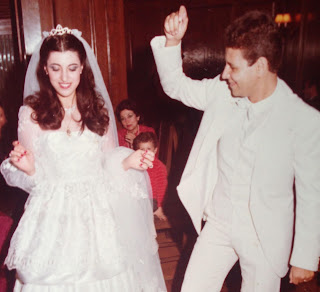Everything everywhere all at once | Kolo Ala Kolo (1974)
In the way that punk made music accessible (how many accounts of singers and musicians seeing their first punk show, saying to themselves and their friends, "We could do that," and subsequently starting their own band have we read?), there is an accessibility to this music, an almost "colloquial" (let's call it) vibe overall.
Farouk Salama and Hassan Abu Itman, who collaborated on "Salamitha Oum Hassan" (music and words, respectively) team up again to provide Ahmed with another track that will hit the charts and survive the ages, "Kolo Ala Kolo," or "Everything on Everything" (Andrew Simon's translation), another likely colloquialism that Google translate wants me to change to "All in All."
Andrew Simon: "Adawiya again engages someone who is better off than himself ... . Whether this wealthier individual is a man or woman is open to interpretation, but what is beyond any doubt is the singer's exasperation in a chaotic world. 'What does he think we are,' Adawiya asks throughout the tune, 'are we not good enough for him?'"
كله على كله
لما تشوفه قول له
هو فاكرنا ايه
مش ماليين عنيه
مش ماليين عنيه
كله على كله
بره
واللي بره مين
داحنا احنا معلمين
لو الباب يخبط نعرف بره مين
هو فاكرنا ايه
مش ماليين عنيه
قول له ان كنت تقيل
والا ما لكش مثيل
قلبي ما هواش مسرح
لهواية التمثيل
هو فاكرنا ايه
مش ماليين عنيه
Interestingly, Simon suggests that this and other songs like it "arguably proved popular not for their potential political import but for their embrace of familiar scenes, common obstacles, and colloquial Egyptian Arabic."
Ahmed and shaabi are not unique in the real-time popularity (and often critical dismissal) of an artist or genre embodying the everyday, the colloquial. Poets from Dante to Orhan Veli to the beats and flarf, all of whom turned toward the language and expression of the contemporary, enjoyed varying degrees of simultaneous success and critical rebuff during their day. However cringe we now find Rosanne Barr, the OG late-1980s sitcom "Rosanne" was wildly popular (and, in its case, critically adored), purely it would seem for its representation of the working class and its "familiar scenes, common obstacles, and colloquial [language]." Finally, consider the birth of rock 'n' roll or the brief explosion of punk or early hip-hop. Or closer to Ahmed, Egyptian mahraganat.
Speaking personally and as a complete outsider, I fell madly in love with Ahmed's sound the first time I heard him. I had been listening to Arabic music for nearly 20 years before that, and was familiar with some of the singers he may have influenced, like Amr Diab or Hakim. But there wasn't anything, not really, that sounded like that first collection I stumbled upon. The pared-down ensemble. The looseness of timing, brief solos, and coloration. It is speculated that Ahmed's deep association with the mawwal led to his encouraging his musicians to improvise their parts, rather than obey a fixed-in-stone score.
In the way that punk made music accessible (how many accounts of singers and musicians seeing their first punk show, saying to themselves and their friends, "We could do that," and subsequently starting their own band have we read?), there is an accessibility to this music, an almost "colloquial" (let's call it) vibe overall. That, I would argue, must have had an enormous impact on listeners at the time as well as the language itself.
Speaking of vibe: how about that amazing proto-mahraganat organ action that opens "Kolo Ala Kola"? Let me be the first to postulate that it must have been performed by Ahmed's Sout El Hob label mate Hany Mehanna. (As we'll see in a future post, the two artists appear on the same 1974 cassette.)
The B-side, "Ya Qalbi Sidak," likewise includes a rousing organ intro -- and both are amped up to Maximum Danceability. This is pure pop for then people.







Comments
Post a Comment